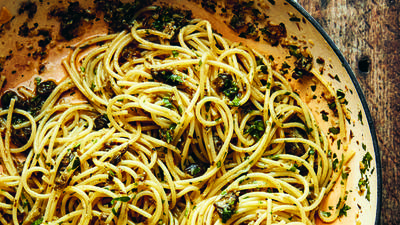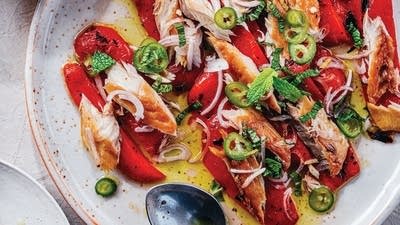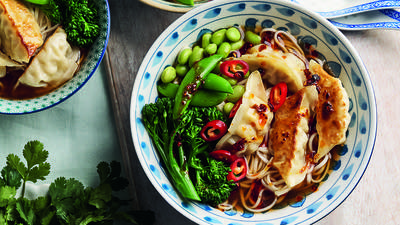
Spanish chef José Andrés is one of those people who sees his work through several different prisms. In his four Washington, D.C., restaurants, he vaults back and forth over the creative fence -- from the edgiest of edgy in one eatery to traditionalist in the other. In his PBS series José Made in Spain, he's all about the culture of the food. And in his culinary think tank, he's the cook with the new techie toys.
What feeds all of this? The running reference you get when you talk to Andrés is the importance of his cookbook collection -- first editions no less.
Lynne Rossetto Kasper: I understand that you collect first-edition cookbooks, and that many of them are in English. How did this start?
José Andrés: Since I was 15 years old when I started in the cooking business, to go and to buy old books that I could afford was a way for me to start connecting with a past that I wanted to know more about.
LRK: What are some of the most significant books for you in the collection?
JA: I have many favorites for many reasons. You need to understand the books: If you listen to them, they are talking to you, not only when you are reading them, but when you have them in your hands, when you open them. The books -- I'm a big listener even if I love to talk too -- they are talking to you. They are telling you things that sometimes you aren't able to find by reading through the books.
Andrés' 3 favorite first-edition cookbooks
1. The Joy of Cooking, by Irma Rombauer, 1931
Every book has a different spirit. The Joy of Cooking to me was very unique because it was my connection to try and understand what happened in America, what American cooking was all about. You need to understand where you belong, and I belong to America right now. Yes, I can try to bring the spirit of Spain and my country into America, but I will do this better if I understand the spirit of America.
When I got the first edition by Irma Rombauer, printed in St. Louis in 1931, and I started going through the pages, I had the feeling that I started understanding what American cooking is today and what the potential of American cooking is tomorrow.
I found many things that were surprising. Some things I will tell you and you will think, "Jose, that's naive." But it's good to be naive when you're searching. One thing, for example, is that it is so funny when Rombauer actually clarifies what frying is. She needs to explain that technically frying in many parts of the world is immersing -- submerging -- a piece of something into a big swimming pool of hot oil. But actually in the southern parts of America, the fried chicken would be more of a pan-fried chicken. To me these kinds of details open amazing ways into understanding what cooking was 70, 80 years ago. That to me is fascinating.
2. The Art of Preserving All Kinds of Animal and Vegetable Substances for Several Years, by Nicolas Appert, 1811
I love history. We have a tendency to think that the moments of war are only negative moments. Yes, we don't want war, but sometimes through those war moments something unique happens. One of my favorite books is by the Frenchman Nicolas Appert. He was the person who invented canning.
Why? Napoleon Bonaparte was more than a war leader who had the big mind to win battles. To win battles, he also had to feed his troops in the war zone. He was giving a big reward to anyone who could come up with a mechanism to achieve this in a simple way. Appert invented canning -- amazing.
3. Arte de Cozina, Pasteleria, Vizcocheria y Conserveria, by Francisco Martínez Montiño, 1611
I have many, many favorites from Spain. In Spain we need to remember that back in the early 17th century, right after the Spaniards discovered America, all the great products were coming through Spanish ports. The tomatoes that we think of today as normal things, the green peppers, the corn, they were all very new.
I got this book printed in 1611 -- I have a later edition -- by a cook named Francisco Martínez Montiño. He was the chef of Philip II, Philip III and Phillip IV during the golden moment of Spanish power. Through this book, you have an idea of what the king was eating and what new ingredients were arriving to the European tables.
They were still very dubious of the food of the Americas. You would think that new ingredients would go into the recipes -- especially the recipes of the king -- overnight. Actually, we had to wait many years later for an Italian book to have the recipe for a tomato sauce that they called Spanish tomato sauce. Even the Italians in this first recipe mentioned that Spain was the first country that carried this everyday tomato sauce.
Going through the book, you can concentrate on one thing alone -- one thing alone will fill not only your entire day, but your entire week, your entire month.
Before you go...
Each week, The Splendid Table brings you stories that expand your world view, inspire you to try something new, and show how food connects us all. We rely on your generous support. For as little as $5 a month, you can have a lasting impact on The Splendid Table. And, when you donate, you’ll join a community of like-minded individuals who love good food, good conversation, and kitchen companionship. Show your love for The Splendid Table with a gift today.
Thank you for your support.
Donate today for as little as $5.00 a month. Your gift only takes a few minutes and has a lasting impact on The Splendid Table and you'll be welcomed into The Splendid Table Co-op.




